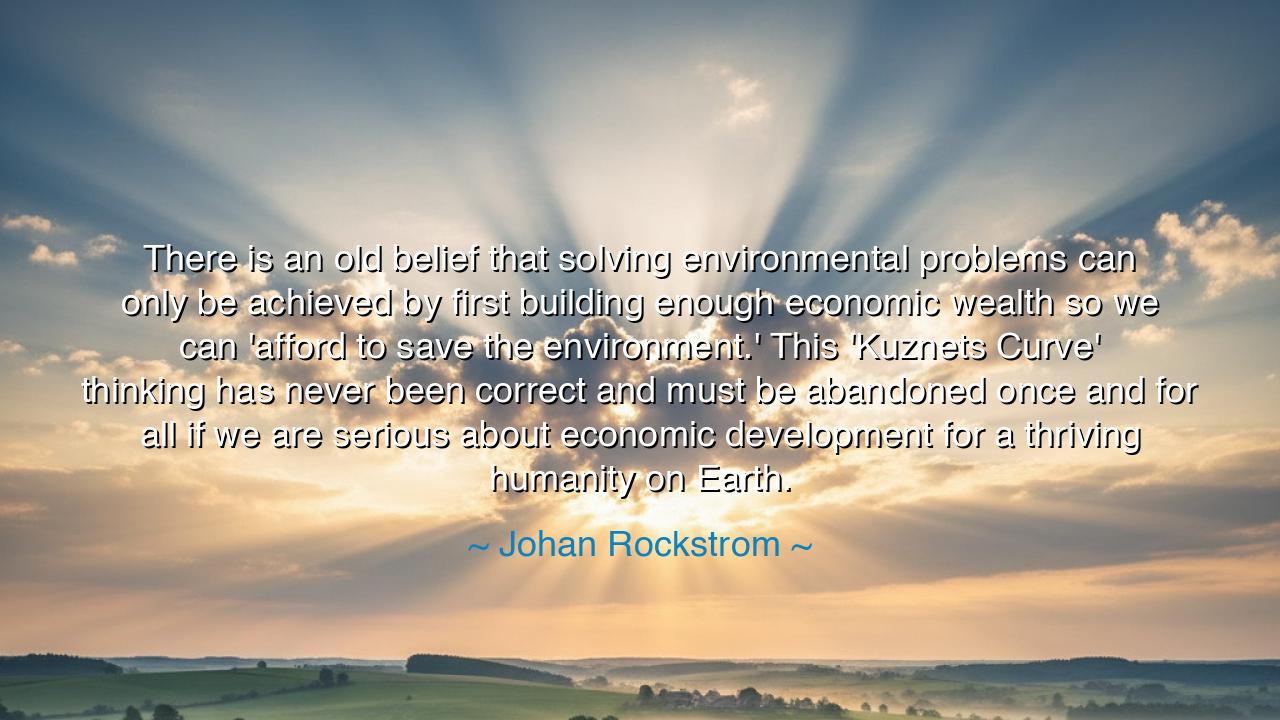
There is an old belief that solving environmental problems can
There is an old belief that solving environmental problems can only be achieved by first building enough economic wealth so we can 'afford to save the environment.' This 'Kuznets Curve' thinking has never been correct and must be abandoned once and for all if we are serious about economic development for a thriving humanity on Earth.






Hear the words of Johan Rockström, a guardian of earth’s wisdom and a herald of planetary boundaries, who declared: “There is an old belief that solving environmental problems can only be achieved by first building enough economic wealth so we can ‘afford to save the environment.’ This ‘Kuznets Curve’ thinking has never been correct and must be abandoned once and for all if we are serious about economic development for a thriving humanity on Earth.” His words cut through illusion like a sword through mist, warning us that delay is death, and that the old faith in prosperity before protection is a false idol leading us toward ruin.
The origin of this saying lies in a flawed theory of the past: the Environmental Kuznets Curve, which claimed that as nations grew richer, their pollution would at first increase, but later decline as wealth gave them the means to restore balance. Many leaders embraced this as a comforting myth, allowing them to ravage forests, poison rivers, and blacken skies in the name of “development,” believing that someday wealth itself would heal the wounds. But Rockström, having studied the limits of Earth’s systems, declares that this faith was misplaced. For in truth, some wounds cannot wait for wealth to mend them; they grow too deep, too fast, until no gold can restore what has been lost.
History gives proof of this. In the days of the Industrial Revolution, England’s cities swelled with coal smoke, choking the lungs of workers and darkening the very skies. Only after generations of suffering and death did reforms bring cleaner air. Yet the rivers of that land, once poisoned, took centuries to recover—and some never did. The wealth earned from smoke did not swiftly heal the harm; it prolonged it. And in our own time, the burning of fossil fuels has brought forth the warming of the atmosphere, the melting of ice, the rising of seas. We cannot wait for some distant prosperity to rescue us, for by then, the rescue may no longer be possible.
Rockström’s words are not merely condemnation, but a call to courage. He reminds us that economic development and environmental protection are not enemies to be reconciled in the future, but companions that must walk side by side now. True wealth is not measured in coins or markets, but in breathable air, fertile soil, drinkable water, and stable climates. What good is profit in a world of droughts and floods? What meaning has growth when the foundation of life is crumbling beneath it?
Consider the tale of Costa Rica. Once, its forests were stripped away in the name of short-term gain. But when the nation chose to reverse its course, protecting forests and investing in nature, it discovered prosperity not in destruction but in preservation. Tourists came to see its jungles, rivers, and creatures; its people gained livelihoods while its ecosystems flourished. Here is the living proof of Rockström’s claim: that by protecting the environment, a nation can prosper more deeply than by sacrificing it.
The lesson, O listener, is clear: abandon the lie that we must destroy today to save tomorrow. The future is not purchased by delay, but by action. Humanity must weave its prosperity into the very fabric of Earth’s resilience, or else the fabric itself will tear. We must cease to ask, “Can we afford to protect the environment?” and instead recognize the truth: we cannot afford not to.
And what then shall we do in our own lives? Support policies and leaders who bind economy to ecology. Choose goods and services that sustain rather than destroy. Plant trees where forests have been cut, conserve energy where waste abounds, and speak boldly against those who cling to the old myths of the Kuznets Curve. Teach children that wealth is not the right to plunder, but the wisdom to protect.
So remember the teaching of Johan Rockström: the earth does not wait for us to grow rich before it collapses. Act now, live wisely, and let economic development be joined to stewardship, so that humanity may not merely survive upon Earth, but thrive in harmony with it. This is not only wisdom for today, but the path of hope for generations yet unborn.






AAdministratorAdministrator
Welcome, honored guests. Please leave a comment, we will respond soon